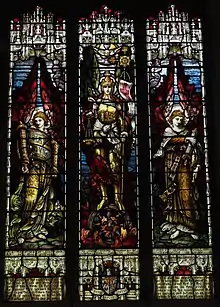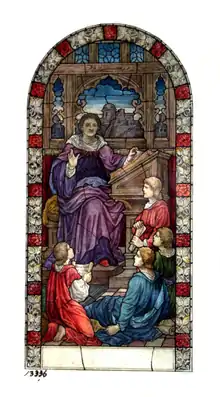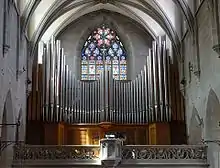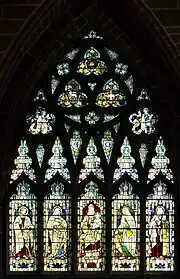Heaton, Butler and Bayne
Heaton, Butler and Bayne were a British firm who produced stained-glass windows from 1862 to 1953.[1][2]


History
Clement Heaton (1824–82)[3] founded his own stained glass firm in 1852, joined by James Butler in 1855. Between 1859 and 1861 they worked alongside Clayton and Bell and were joined by Robert Turnill Bayne (1837–1915), who became their sole designer and a full partner in the firm in 1862. The firm was known as Heaton, Butler and Bayne from 1862.
His windows show strong design and colour, and are often recognisable by the inclusion of at least one figure with Bayne's features and long beard. They established their studio in Covent Garden, London, and went on to become one of the leading firms of Gothic Revival stained glass manufacturers, whose work was commissioned by the principal Victorian architects. A change in direction came with their production of windows to the designs of Henry Holiday in 1868, which show a more classical influence at work. During a long career, the firm produced stained glass for numerous churches throughout the Britain and the Empire, as well as the United States.
Westminster Abbey includes a Heaton, Butler and Bayne window, installed in 1868, an early example of the work of Henry Holiday. Also the stained glass in the east window of the Parish Church of St Mary Magdalene, Gillingham.[4] Other windows by this firm are in Wimborne Minster 1857, Peterborough Cathedral 1864 and St Mary's Parish Church, Hampton c1888. A documentary film, Stained Glass Masters: Heaton, Butler and Bayne, was produced in 2000 by the film maker Karl Krogstad. The documentary was narrated by Edgar Award winning author Burl Barer.
Selected works


England
- St Mary's Church, Banbury
- Tewkesbury Abbey, Tewkesbury, Gloucestershire (Adoration of the Magi, 1869)
- St. Lawrence's Church, St Lawrence, Isle of Wight (Parable of the Sower)
- Church of St. Mary the Virgin, Staverton, Northamptonshire (Faith, Hope, and Charity, 1896)
- St. Peter's Church, Dunton, Norfolk
- St. Mary's Church, East Carleton, Norfolk (Saint Mary and Jesus Christ)
- St. James' Church, Hebden Bridge, West Yorkshire
- St Mary's Church, Osterley
Northern Ireland
- St. Eugene's Church, Newtownstewart, County Tyrone (Memorial to Rev. James McIvor, 1909)[5]
Wales
- Drybridge House, Monmouth, Monmouthshire (Memorial Window to C. H. Crompton-Roberts, 1894)
- Church of St. Nicholas, Trellech, Monmouthshire
Canada
France
Russia
Switzerland
United States
- St. Saviour's Church, Bar Harbor, Maine
- Calvary Episcopal Church, Pittsburgh, Pennsylvania
- St. Alban's Church, Philadelphia, Pennsylvania
- St. Matthew's Cathedral, Laramie, Wyoming
References
- University of Wales (2013). "Heaton, Butler & Bayne. (1852-1953)". Catalogue of Stained Glass in Wales. Retrieved 22 December 2013.
- Hicks, Carola (2002). "Heaton, Butler & Bayne". In Macy, Laura (ed.). Oxford art online. Basingstoke, England: Macmillan. ISBN 9781884446054.
- Fleming, John & Hugh Honour. (1977) The Penguin Dictionary of Decorative Arts. London: Allen Lane, p. 371. ISBN 0713909412
- "History of Gillingham". kentpast.co.uk. 2010. Retrieved 18 April 2018.
- G. Eric Ferguson, June Cochrane, John Dunbar, Joan Ferguson, Victor Laughlin, Lily Loughlin, Carol McKelvey, eds. “The Changing Years in the Grouped Parishes of Ardstraw, Baronscourt and Badoney Union. (Omagh, County Tyrone: Graham Printers, 2001).